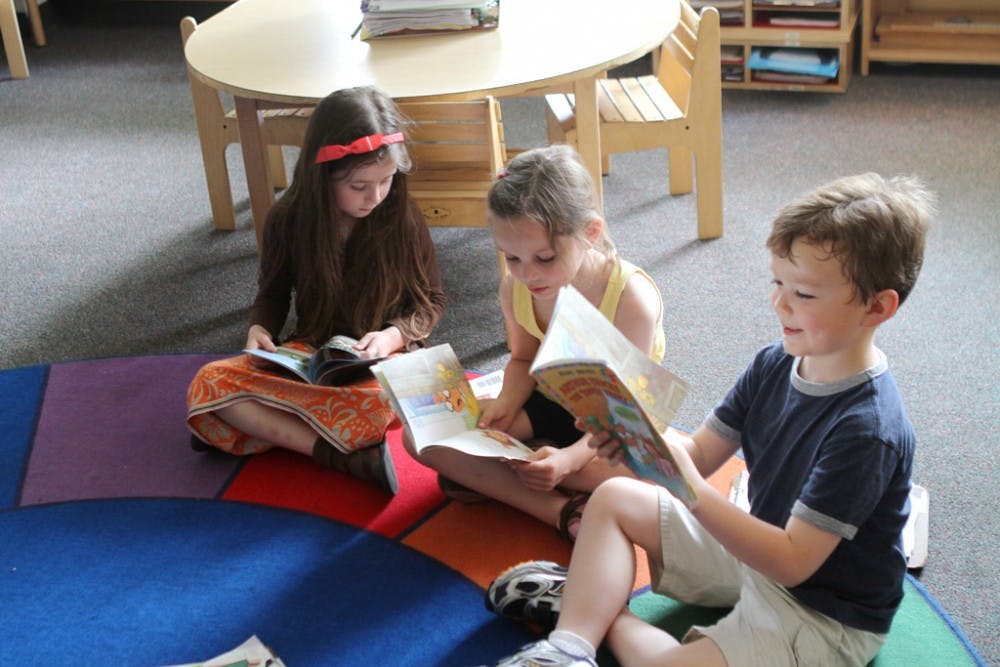A community health program launched by Duke University Medical Center is connecting Duke students with the Durham community in order to enrich both.
The Learning Together Program, operated by the Department of Community and Family Medicine, provides opportunities for students to teach curricula about health prevention and promotion in Durham public schools. The Learners Teaching Learners division launched in 2004, and the program has now grown to more than 100 participants and eight public schools in partnership.
“The school system had long been asking us if we could have students to come in to work with children,” said Kim Nichols, program coordinator of Learning Together. “We had a lot of health professional students who wanted to do health-related projects. The program was initiated to serve the needs of both.”
After a training session, undergraduate and graduate student volunteers teach once a week at one of the participating schools, Nichols said. Instead of having a set of standardized teaching materials, the program encourages participants to design curricula that meet the unique needs of each school.
“We ask the school what topics they do or do not want us to teach,” Nichols said. “We give the children what they want but not what we feel they want.”
The materials taught cover a wide range of topics including hygiene, nutrition, stress management, drug and alcohol education and sexual precaution, Nichols added. Designers of the curriculums also try to put balanced emphasis on physical and mental health.
The variety in teaching styles helps engage young people, said Karen Ingram, curriculum coordinator of the City of Medicine Academy—a public school where Duke students have been teaching for the past three years.
“Our students gain from different sources and different modes of instruction in those classes,” she said. “Duke students are able to use their expertise to create different learning settings, which our students are excited about.”
Although originally geared towards graduate student volunteers, the program now welcomes undergraduate students as well. In cooperation with the Career Center and the Duke Chapel Pathways Program, it attracts undergraduate students who are interested in both a health-related careers and community service.
Senior Mona Xiao said she appreciated the atmosphere created by the program that enables the graduate and undergraduate students to unite.
“Via the Learning Together Program, I worked with a fellow undergraduate intern, students from Duke’s medical assistant and physician assistant [programs] and doctorate-level physical therapy students,” Xiao said. “I gained a very eye-opening exposure to many of the health education and promotion service roles that are integral to patient and community health.”
Participants also described the satisfaction of working with children.
“The kids are curious, engaged and extremely energetic, and it’s been a valuable opportunity to teach them some of the basics about hygiene, nutrition and exercise,” Kevin Huang, a second-year medical student, wrote in an e-mail Monday. “On top of all of that, it’s just a lot of fun.”
Nichols noted that an academic background in health and medicine is not required for students to succeed in the program—personality and passion count more.
“We are looking for students who are responsible, professional and devoted to serving the community,” Nichols said. “The program is all about building relationships by respecting the community and serving them well.”
Duke students’ impact is also beyond the classroom. They become mentors and establish enduring relationships with their pupils, said Erika Newkirk, school site coordinator of C. C. Spaulding Elementary, which has been collaborating with the Learning Together Program for three years.
“These professionals are role models, and our elementary students really look up to them,” Newkirk wrote in an e-mail Wednesday. “Not only are they dedicated to coming to our program every week, they are dedicated to making a difference and impacting each of our children... one child at a time.”
Get The Chronicle straight to your inbox
Signup for our weekly newsletter. Cancel at any time.

